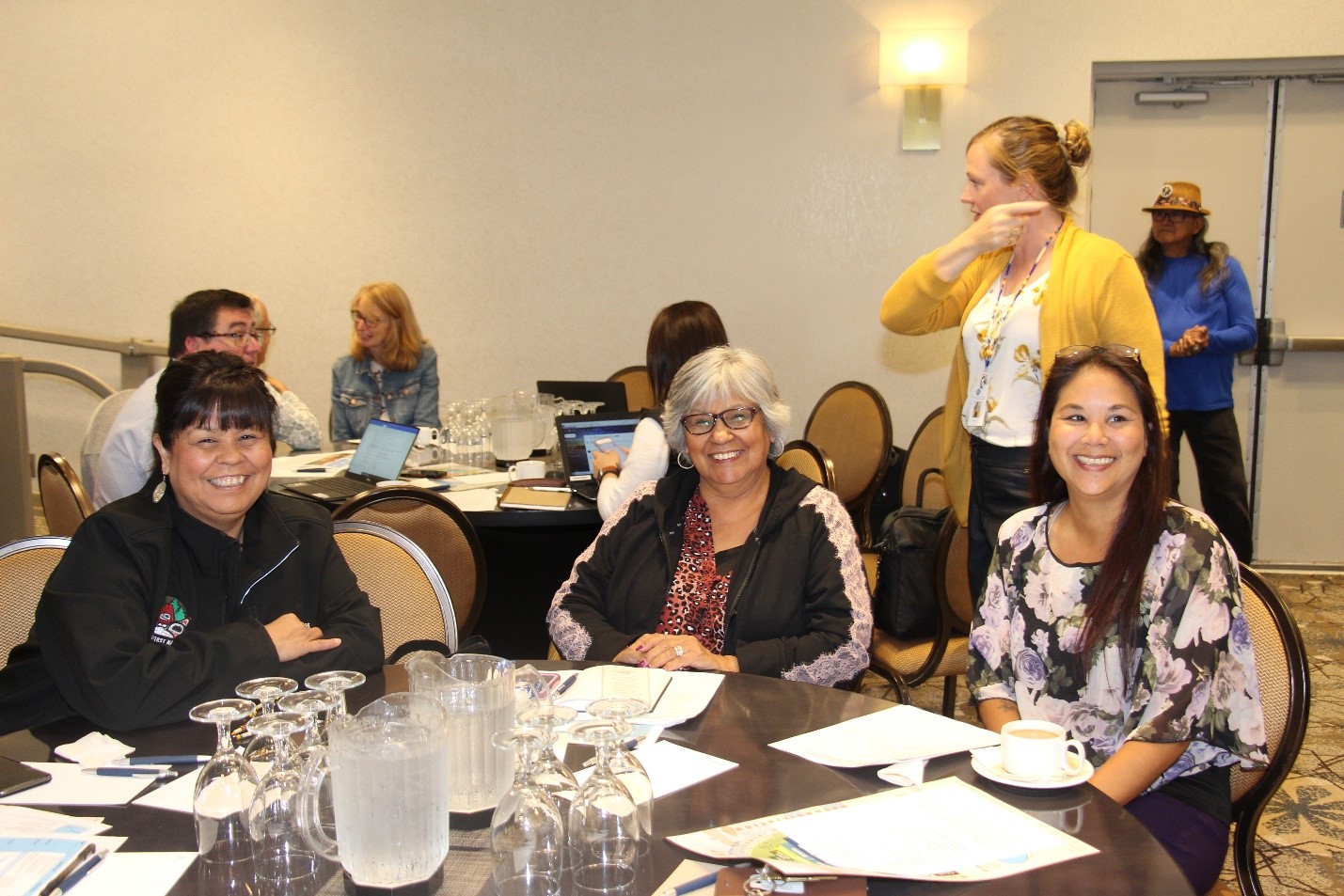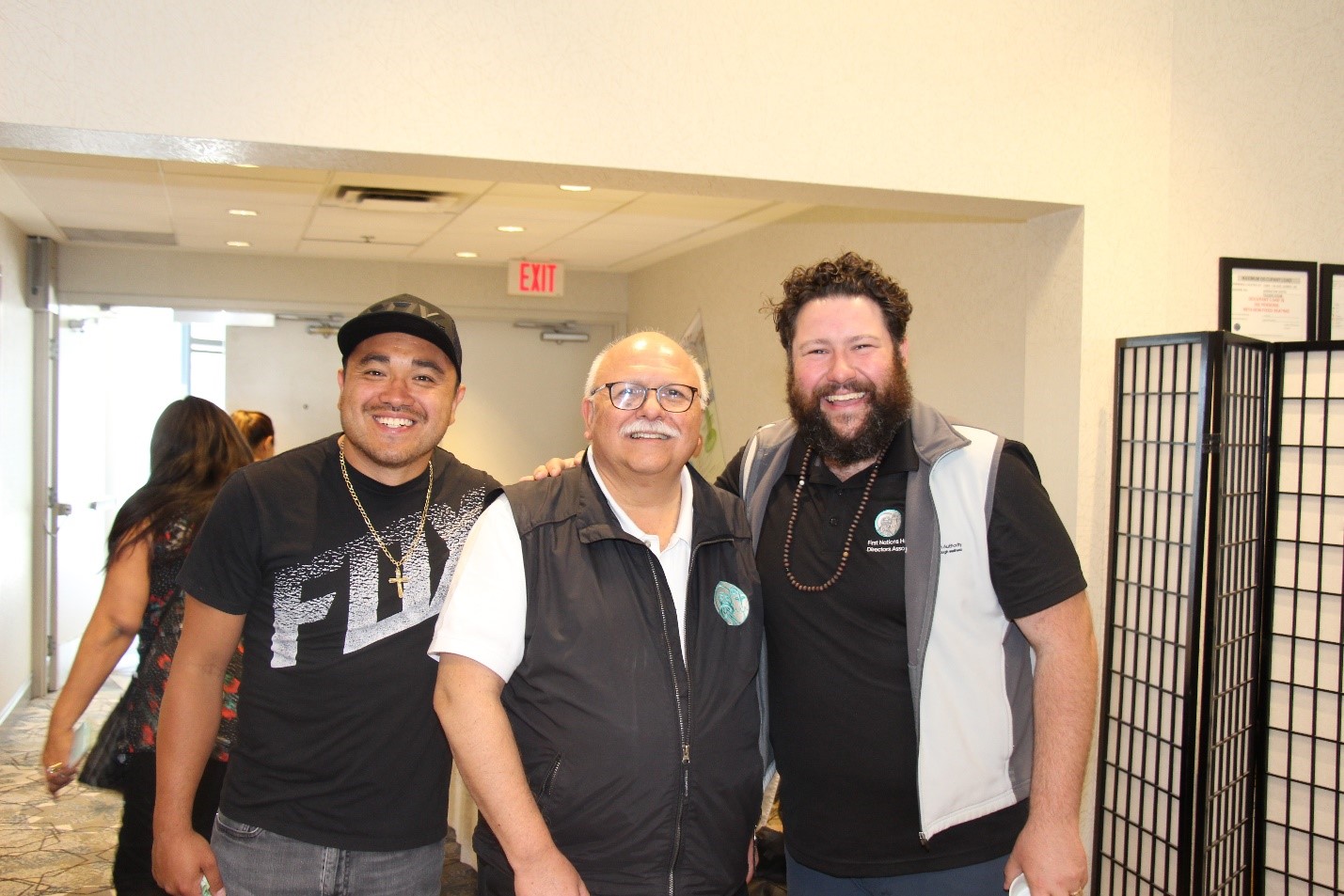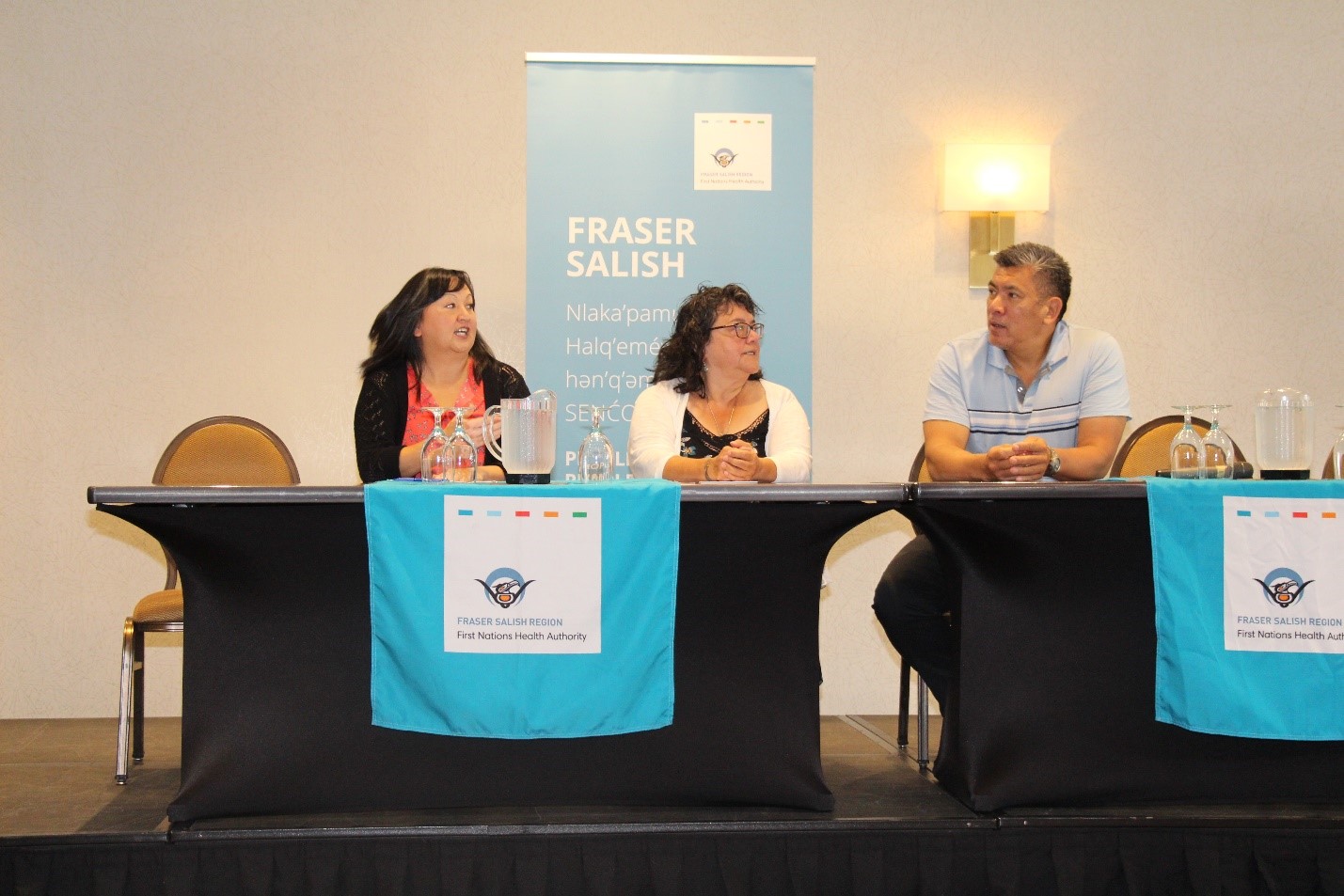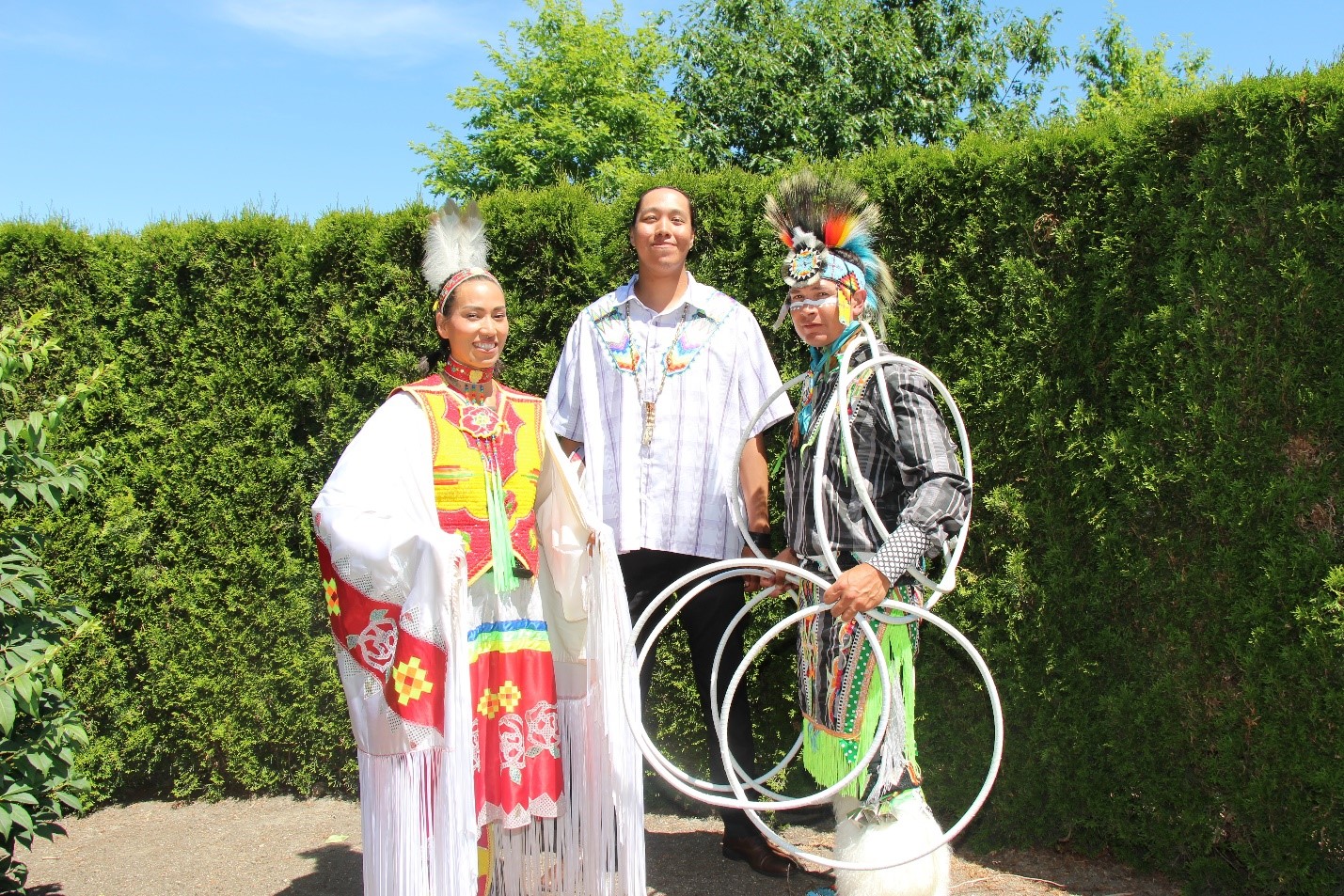
Caucus delegates Brenda Morgan, Chief Alice McKay and Annie Silver (L-R) chat during a wellness break.
From June 10-11, 2019, Fraser Salish Region leadership gathered for Caucus sessions on the unceded Territory of the Coast Salish people and the shared Territories of the Kwantlen, Katzie, Kwikwetlem, Qaywayt, Semiahmoo and Tsawwassen Nations.
2019 marks the first year of Health Governance Caucus, a new approach taken by all regions in response to community recommendations that political/governance topics be separated from technical/operational topics. The new format better supports leaders to share experiences and governance knowledge and to highlight current issues faced by their communities.
In total, 115 delegates attended Caucus, including eight Chiefs, 11 proxies and 17 Health Leads. The two days of Caucus were chaired by the First Nations Health Council (FNHC) representatives for the region.
Leaders discuss mental health and wellness
Day one of the Fraser Salish Governance Caucus opened with prayer and a welcome to the Territory. FNHC Representative Willie Charlie greeted delegates, before inviting leaders to the stage for a traditional welcome and prayer, ensuring that local protocol was respected. This group included Marilyn Gabriel, Kevin Kelly and Michael Kelly from Kwantlen First Nation; Chief Harley Chappell and Councilor Joanne Charles from Semiahmoo First Nation; and Chief Grace Cunningham and Damian George from Katzie First Nation.
FNHC representative Grand Chief Doug Kelly joined the stage to thank Willie Charlie and the other leaders. He then provided an update on FNHC work, including progress on the Memorandum of Understanding (MOU) commitments on mental health and wellness.
Continuing the discussion on mental wellness, Michelle DeGroot, First Nations Health Authority (FNHA) Executive Director for the Fraser Salish Region, presented the newly developed five-year Mental Health and Wellness Service Plan, seeking its endorsement from Caucus delegates. The plan takes a phased approach to mental health support, with phase one focusing on a training strategy and hiring five Community Coordinators. Caucus delegates agreed to endorse the plan.
Attendees also heard from Katie Hughes, FNHA Executive Director, Mental Health and Wellness, on the MOU and the innovative ways that communities and Nations are already proposing to use the funding.
Next, Dr. Martin Lavoie, Vice President for Population Health and Chief Medical Officer (CMO), Fraser Health, discussed current collaboration with the Fraser Salish Region and First Nations communities to improve services. Most significantly, Fraser Health continues to implement a cultural safety and humility strategy.
Ministry of Child and Family Development initiatives
Following the presentations on mental wellness, a panel from the Ministry of Child and Family Development (MCFD) updated delegates on current work in the East and North Fraser regions. The panel included Holden Chu, Executive Director of Service; Walter Serraglio, Acting Executive Director of Service; Diane Bruce, Director of Operations – Circle 5; Debbie Samija, Executive Director of Service; and Shasha Chaudhary, Director of Operations in North Fraser.
Among its updates, the panel discussed a pilot initiative with Boothroyd, Seabird, Spuzzum, Sts'ailes and Peters First Nations called "Xyólheméylh Lexw Awtexw" ("Take Care of Home and Each Other"), which draws on community knowledge and teachings to support greater wellness for families and children.
They also shared information on Circle 5 Child and Youth Mental Health initiative, which aims to enhance services for youth through a combination of mainstream services and cultural supports.
Other activities discussed included a canoe journey in the North Fraser region, and updates on the Fraser River Indigenous Society.
Fraser Salish leaders raised concerns regarding ongoing bureaucracy and accessibility challenges. Leaders also mentioned the need for more holistic family services and flexible funding options. While some delegates expressed that MCFD is not yet doing enough to support families, they agreed that partnership is key.
FNHA service updates

Caucus delegate Joseph Chapman visits with FNHA staff members James George and Andrew Sawyer.
Colleen Erickson, FNHA Board Chair, presented on the 2019/2020 Summary Service Plan, highlighting the five-year goals and outcomes and the Annual Key Priorities for the next year, which shape the FNHA's workplans.
Erickson also shared results from the First Nations Health Benefits evaluations. Positive feedback included greater use of benefits and stronger relationships with BC's specialty health agencies, while concerns included confusion, instances of paying out of pocket and medical travel.
Next, Richard Jock, FNHA COO, shared updates on the Community Capital Program, touching on the need for additional funding and potential solutions. Richard Jock and Michelle DeGroot also spoke on primary health care work, including the First Nations-led primary health care human resources model and the development of a Five-Year Service Plan.
Darren McKnight, FNHA Director of First Nations Health Benefits, provided an update on the Health Benefits transition of dental, vision and medical supplies and equipment. Sharing feedback from the 2018 Health Benefits focus groups, Darren McKnight noted the top four recommendations:
• Enhanced coverage, frequency and flexibility;
• Improved provider service, education and cultural safety;
• Better communication and engagement with the FNHA; and
• Simpler pre-approval process.
Discussion followed, with some leaders sharing concerns about medical travel and follow-up care for individuals attending treatment. Riverstone Detox Centre was noted as a more holistic, long-term approach to treatment.
Responding to crisis
The final presentations of day one concerned crisis response and emergency planning.
Dr. Evan Adams, FNHA CMO, shared current opioid health statistics, confirming that the crisis continues to impact First Nations disproportionately. Dr. Adams' message was clear: "We must do everything in our power to keep our people alive"—and that root causes must be addressed. The priority areas of concern include urban populations, supports for women and culturally safe services.
Following Dr. Evan Adams' presentation, leaders noted that further opioid support is still needed in community, not just cities. Multiple leaders also addressed the topic of trauma, sharing personal experiences and heartfelt words about loved ones lost to the crisis.
Emily Dicken, FNHA Director of Crisis Response, then provided updates on emergency management including five key FNHA priority areas:
• Engagement with community:
• Emergency management training;
• Developing tools to support response;
• Implementing the FNHA Health Emergency Operation Centre; and
• Building strong partnerships with partners.
Emergency management updates were also shared by Ian Cunnings, Senior Manager, EMBC, and Clint Parker, Fire Centre Manager, Coastal Fire Centre.Finally, the emergency response session was closed by Bill Guerin, Associate Regional Director General, Indigenous Services Canada (ISC). Bill Guerin acknowledged the impacts of floods and wildfires on the province, and commended First Nations communities for their leadership during these crises.
In April 2019, the FNHC, ISC and the Province signed a tripartite MOU on emergency management. The MOU is intended to complement Nation-based approaches, and the partners have committed to developing a work plan for validation by First Nations.
Following this announcement, leaders shared concern that they were not fully consulted on the MOU, and asked for more active First Nations decision-making. Grand Chief Kelly thanked leaders for their comments, agreeing that meaningful Nation-to-Nation engagement with partners is necessary.
FNHC representative Derek Hansom offered closing statements for the day and Damien George shared a closing prayer.
Discussing social determinants of health
The second day of Caucus was opened with prayer and song by Elder Eugene Harry (XiQuelem), a member of Cowichan Tribes.
Harry spoke on the importance of connection, the old ways of being together, and what kept the ancestors well. He reminded the room that each person has a crucial role to play in supporting current and future generations.
That morning Grand Chief Kelly spoke on the connections between the ten-year strategy on social determinants of health and the newly endorsed Mental Health and Wellness Service Plan. "They listened to us, they heard us, they responded, and they prepared a strategy for us to move forward," he said, thanking the staff who worked on the Service Plan.
Housing, service and infrastructure improvements

Chief Grace Cunningham, Kelowa Edel and Michael Sadler present on housing, including new services and best practices.
Grand Chief Doug Kelly then shared an update on the $60 million invested in capital and infrastructure projects across the province, including renovations and improvements to treatment centres. He acknowledged that more work needs to be done, but that the projects chosen were based on the highest needs.
Kelly then introduced a housing panel, including Chief Grace Cunningham, Katzie First Nation, Kelowa Edel, Stó:lō Nation Health Director, and Michael Sadler, Director of Indigenous Relations at BC Housing.
Michael Sadler discussed BC Housing's new initiative to support on-reserve housing, the organization's first time providing this support. Five-hundred-and-fifty million is set aside for the project over ten years. The first $400 million is already spent and the remaining funds will be spent by yearend, demonstrating the immense need for funding of this kind.
In addition, greater funding is being sought to build dedicated spaces for medical stays and transitional housing from treatment (a project specific to the Fraser Salish Region). "We try to fit our program to what your needs are rather than fitting your needs to what our program is," said Sadler.
Chief Cunningham shared a case study on the development of the Katzie First Nation Housing Society and their successful BC Housing proposal to construct three new buildings in the community that will support those struggling with homelessness, substance use challenges and other mental wellness concerns. Each building will serve separate populations and include on-site support services.
"We always work from a place of empowerment. We never tell people they need to be well," said Chief Cunningham, who says the new spaces will provide opportunities for people to build the lives they want to live.
Kelowa Edel shared her organization's success story of housing homeless community members in the Chilliwack area. With the help of a Service Navigator, all families supported by the organization continue to receive housing.
Grand Chief Doug Kelly also presented with the RCMP's Bal Massey on new partnerships with the RCMP.

Throughout lunch, Spindle Whorl Dance Group shared songs and dances. "The decisions that you make impact our communities… this is how we're becoming healthier people," said dancer Theresa Keliya Warbus (left).
Communities come together in ceremony
Following lunch, Willie Charlie led a blanketing ceremony, calling forward attendees who were mothers, Elders, youth and other community members who represent the next seven generations. "Once in a while we need to be reminded of the ones we've been working for," he shared.
Four witnesses were called, including Elder Harry, FNHC representative Paul Sam, FNHA Board member Helen Joe and Chief Ralph Leon of Sts'ailes. The witnesses spoke on the significance of the blanketing ceremony, supporting the next generation and youth as representatives of the future.
Supporting urban populations and honouring matriarchs
The day ended with two final presentations on the Fraser Region Aboriginal Friendship Centre (FRAFCA) and its services, and then an initiative to honour and learn from Indigenous matriarchs.
Joanne Mills, Executive Director, FRAFCA, shared information on the centre's history and its services, including programming for early years, youth, health and wellness, and community events.
FNHA Board Member Helen Joe then provided information on a project with Katherine Charlie (Sts'ailes) to visit communities to learn what it means to be a matriarch, including an upcoming matriarch gathering in the Fraser Salish Region.
Over two full days, the inaugural Fraser Salish Governance Caucus successfully brought community leadership together to share their views and discuss improved health and wellness for their people.

